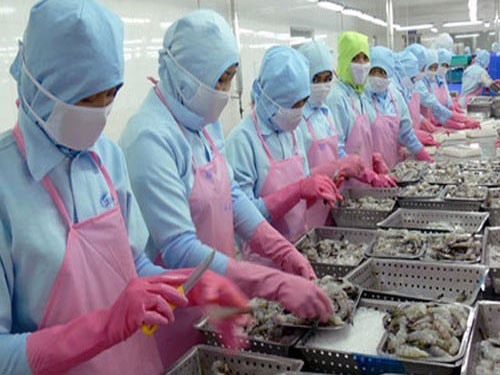 Economy
Economy

South Korea will send an inspection team to Việt Nam to assess the country’s activities in controlling chemicals and antibiotics in the processing and export of shrimp to South Korea in June this year, according to the Vietnam Association of Seafood Exporters and Producers (VASEP).
 |
| In the first two months of this year, the export of shrimp to South Korea achieved growth at 40.2 per cent. — Photo baocongthuong.com.vn |
HÀ NỘI — South Korea will send an inspection team to Việt Nam to assess the country’s activities in controlling chemicals and antibiotics in the processing and export of shrimp to South Korea in June this year, according to the Vietnam Association of Seafood Exporters and Producers (VASEP).
The trip was announced after the South Korean Ministry of Food and Drug Safety (MSDF) sent two letters in April announcing the consecutive detection of Nitrofurans residue in shrimp shipments from Việt Nam. Nitrofurans are a class of drugs typically used as antibiotics or antimicrobials.
To control the chemical and antibiotic hazards in seafood and prepare to welcome the South Korean delegation, the National Agro-Forestry-Fisheries Quality Assurance Department (NAFIQAD) has issued measures and required seafood processing and exporting enterprises to South Korea to immediately implement such measures.
Seven Vietnamese shrimp exporters to Korea have MFDS warnings on Nitrofurans, including Thuận Phước Seafood Joint Stock Company - DL 32; HAVICO 2 Factory; Hải Việt Joint Stock Company - DL 362; Nam Long Export Seafood Processing Enterprise; CADOVIMEX - DL 85 Import Export and Processing JSC.
All MFDS warnings about Nitrofurans involve white-leg shrimp. These shipments were discovered between January and April this year. South Korea has discovered shipments of white-leg shrimp with Nitrofurans over the past few years.
From 2017, South Korea has applied Nitrofurans inspections for each batch of white-leg shrimp imported from Việt Nam.
General Secretary of VASEP, Trương Đình Hòe, told nongnghiep.vn that in the shrimp sector, the presence of antibiotics and impurities are two complicated issues that have not been resolved completely and effectively, impacting the production and export of shrimp of Việt Nam.
In order to retain the prestige of shrimp products and the trust of customers, shrimp processing enterprises have to strengthen control activities and quality testing in the chain, from source to finished product, however this increases production costs and prices.
South Korea is one of eight key importers of shrimp from Việt Nam including the EU, US, Japan, China, Australia, Canada and ASEAN, accounting for 88.6 per cent of the country’s total export value. In the first two months of this year, the export of shrimp to South Korea achieved growth at 40.2 per cent. — VNS




